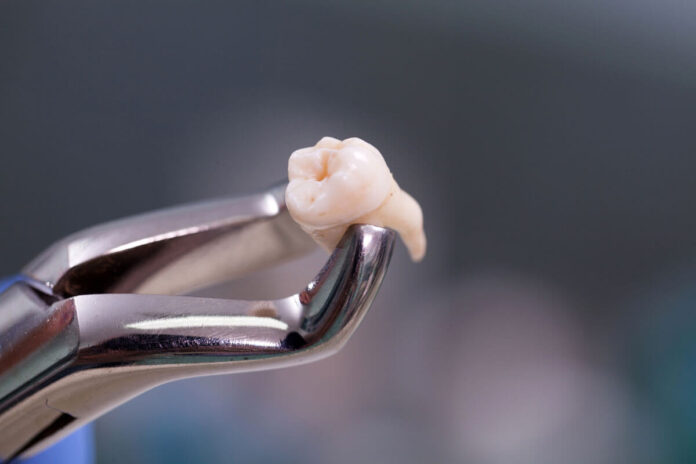
Wisdom tooth extraction is generally safe, but recovery can be uncomfortable for some people.
Knowing how to take care of yourself after the procedure can help you get through the healing process with less pain and discomfort.
This post will discuss helpful post-extraction care tips to recover quickly and safely.
Whether you have already had your wisdom teeth extraction or are planning to do so soon, these tips will help you during the healing process. So, let’s dive in and explore these tips in detail.
Wisdom Teeth Extraction
Wisdom teeth are one of the last teeth to emerge in the mouth, appearing between ages 17 and 25. These teeth are located at the back of the mouth, and most people have four wisdom teeth – two on the top and two on the bottom.
While some people may never experience any problems with their wisdom teeth, others may need to have them extracted. Here are common reasons why wisdom tooth extraction is necessary:
- Impacted teeth: When a wisdom tooth grows at an angle or doesn’t have enough room to come through, it can become impacted. It can cause pain, swelling, and infection.
- Crowding: If there isn’t enough space in the mouth for the wisdom teeth to emerge, they can push teeth out of alignment, leading to overcrowding.
- Decay: Wisdom teeth are often hard to reach and clean properly, leading to decay and cavities.
- Gum disease: Having partially erupted wisdom teeth makes it difficult to clean the area, leaving it susceptible to gum disease.
Proper Recovery

After undergoing a wisdom tooth extraction, proper recovery is crucial. Here’s why:
- Minimizes complications: Following the post-operative instructions provided by the dentist can help minimize the risk of complications such as infection, dry socket, and prolonged bleeding.
- Reduces discomfort: Taking the prescribed pain medication and applying ice packs to the area can reduce swelling and discomfort.
- Promotes healing: Avoiding foods irritating the extraction site and practising good oral hygiene can promote faster healing.
Recovery Tips After Wisdom Tooth Extraction
Recovering from an extraction can be uncomfortable, but there are steps to promote healing.
Immediate Post-Surgery Care

Gauze and Blood Clotting
Bite gently on the gauze placed in your mouth to help control bleeding. Change the gauze every 30 minutes until there is no bleeding.
Avoid rinsing and drinking through a straw within 24 hours after surgery, as it may cause blood clots to dislodge and lead to a dry socket.
Ice Packs for Swelling
Applying ice packs to your cheek can help reduce swelling and discomfort. Apply the ice packs for 20 minutes, with a 20-minute break in between, for the first 48 hours after surgery.
Avoid Hot Liquids and Food
Stick to cold and soft foods such as ice cream, yoghurt, smoothies, pudding and applesauce during the first day or two. You should also avoid hot liquids like tea, coffee or soup for the first few days to prevent irritation to the extraction site.
Eating and Drinking After Surgery
Once you can tolerate solid foods, reintroduce a balanced diet with plenty of nutrient-dense fruits and vegetables.
It is important to stay hydrated after surgery — drink plenty of water and avoid alcohol. Additionally, sucking on sugar-free hard candy or popsicles can help stimulate saliva production and reduce dry socket complications.
Pain Management

A prescription of pain medications from your dentist or oral surgeon will be given, or they will recommend over-the-counter pain relief medication to reduce pain and discomfort. Follow the advised dosage and do not exceed the prescribed limit.
Oral Hygiene
Maintaining good oral hygiene is crucial to prevent infections and promote healing. However, avoid brushing or rinsing the extraction site for the first day after surgery.
Afterward, gently rinse your mouth with warm saltwater or a prescribed mouthwash given by your dentist. Brush your teeth gently, avoiding the extraction site, and floss carefully. Also, avoid smoking and using tobacco.
Follow-up Appointments
Attending all your follow-up appointments with your dentist or oral surgeon is important. During the appointment, they will check for signs of infection and evaluate your healing. Your dentist may also recommend antibiotics if needed.
Signs of Complications
Awareness of any signs of complications after wisdom tooth extraction is important. Some signs include fever, difficulty opening the mouth, severe pain and vomiting. If you experience these symptoms, contact your dentist or oral surgeon immediately.
Conclusion

In conclusion, proper recovery after a wisdom tooth extraction is crucial to avoid complications and promote healing.
Remember to follow the post-operative instructions provided by your dentist, apply ice packs to reduce swelling, avoid hot liquids and food, eat a balanced diet, manage pain with prescribed medications or over-the-counter pain relief, maintain good oral hygiene, attend follow-up appointments, and be aware of signs of complications.
By following these recovery tips, you can get through the healing process with less pain and discomfort. Don’t hesitate to contact your dentist if you experience any issues or concerns. Take care, and stay healthy!








